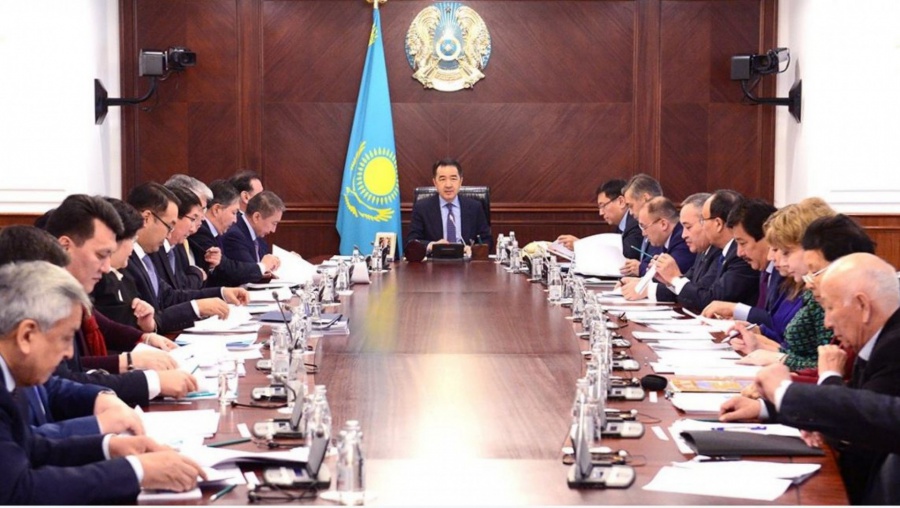ASTANA – Prime Minister Bakhytzhan Sagintayev chaired a meeting in the capital Oct. 16 which provided updates on the five social initiatives from President Nursultan Nazarbayev proposed earlier this year. The discussion covered housing, reducing the tax burden on low-paid workers, higher education accessibility, expanding microcredits and developing the gas pipeline infrastructure to increase its supply.
National Bank chairman Daniyar Akishev reviewed creating the conditions needed to purchase affordable apartments. He noted the 7-20-25 programme, initiated in July, offers citizens the opportunity to make housing purchases through a loan in tenge with an annual rate of 7 percent, an initial contribution of 20 percent and for a period of up to 25 years. Currently, 2,352 applications worth 28 billion tenge (US$76.25 million) have been approved.
“First, a person should choose an apartment based on the criterion in the programme. Secondly, he or she needs to come to the member bank (involved to the programme) and apply for a loan. There is a need to have officially confirmed income documents and not to have housing on the right of ownership. Currently, seven banks are accepting these kinds of applications,” he said.
Minister of National Economy Timur Suleimenov discussed reducing the tax burden to increase wages for low-paid workers. At present, the tax burden is reduced ten times for employees with a salary of up to 25 monthly calculated indices (MCI), or 60,125 tenge (US$163.70)).
“The norms developed will entail losses to local budgets in 2019-2021 in the amount of 93.7 billion tenge (US$255.18 million). Losses for 2019 (29.1 billion tenge (US$79.25 million)) will be compensated by the national budget during the three-year transfers in 2017-2019,” he said.
The third direction involves increasing the accessibility and quality of higher education and improving student living conditions. An additional 20,000 scholarships were allocated, with the total for two years increasing from 39,000 to 69,000, according to Minister of Education and Science Yerlan Sagadiyev.
In addition to the increase in governmental scholarships, unified state testing is held more frequently, graduates are accepted on conditional enrolment and a new admissions model for master’s degree studies has been implemented. Sagadiyev also spoke about dormitory provisions.
Regarding expanding microcredit, Minister of Labour and Social Protection Madina Abylkasymova reported financing has been increased this year by 20 billion tenge (US$54.46 million), including 6 billion tenge (US$16.34 million) in cities and 14 billion tenge (US$38.12 million) in villages. Microcredits totalling 62 billion tenge ($US168.84 million), 45 billion tenge (US$122.55 million) in rural areas and 17 billion tenge (US$46.29 million) for urban areas, are expected to cover 14,000 people.
“In total, from the beginning of the year, 38.4 billion tenge (US$104.57 million) was spent on microcredit, of which 10.5 billion tenge (US$28.59 million) was in urban areas and 27.9 billion tenge (US$75.98 million) in rural areas. The best indicators in terms of the regions are observed in the city of Almaty and the Almaty, West Kazakhstan and Zhambyl regions,” said Abylkasymova.
Microcredits are vital for increasing the income of the self-employed and unemployed population.
“Seven thousand, nine hundred and fourteen people from the self-employed and 979 unemployed were given the opportunity to do business, as well as to formalise their activities. Also, many jobs were created. In total, 8,256 jobs were additionally created by the recipients of microcredits,” she added.
The final initiative relates to improving the country’s gas use. Design and estimate documentation for improvements to the Saryarka gas pipeline in the Kyzylorda-Astana section was approved Aug. 28 and construction and installation is scheduled to begin once the general contractor is assigned, according to First Vice Minister of Energy Makhambet Dosmukhambetov. The company should be named in November or December and the work completed before the end of 2019.
The Saryarka line will be connected to the existing Beineu-Bozoi-Shymkent gas pipeline in the Kyzylorda region. The enlarged line is expected to meet the capital’s demands and populated areas along the Saryarka highway through 2030 and Kokshetau city and the North Kazakhstan region through 2040.


